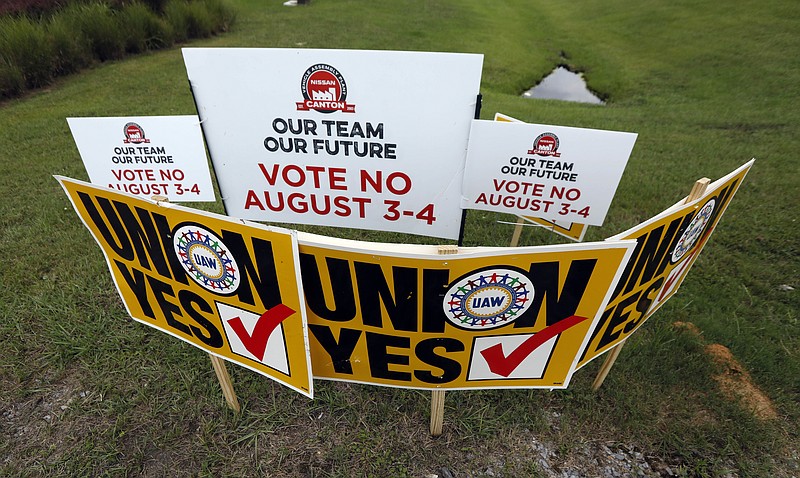What part of "no" do automobile unions in the South not understand?
Auto workers at Nissan's assembly plant in Canton, Miss., voted in a nearly 2-to-1 margin last week (2,244 to 1,307) to turn down an attempt by the United Auto Workers (UAW) to form a union.
The UAW's organizing effort had been at least a decade in length and some say dated to 2003, when the plant opened. The NAACP, actor Danny Glover, U.S. Sen. Bernie Sanders, I-Vt., and local religious leaders and politicians all swooped in to lend their support.
It was a stunning defeat, considering that the union had predicted - not in so many words - that it would win.
So how did UAW President Dennis Williams describe it?
" [I]n no way should it be considered a defeat," he said.
The vote was the first at a Southern automobile plan since UAW's attempt to organize Chattanooga's Volkswagen plant in February 2014. Here as in Mississippi, the union believed it had the votes to win but lost 712-626.
It wasn't the UAW's first rodeo with Nissan. In 1989 and 2001, Nissan workers in Smyrna, Tenn., voted against representation by the union.
The auto workers union is also attempting to organize employees at the Mercedes-Benz plant in Tuscaloosa, Ala., and the Tesla facility in Fremont, Calif.
Earlier this year, workers voted in a nearly 3-to-1 margin against an attempt by the International Association of Machinists and Aerospace Workers to organize a Boeing plan in South Carolina.
We believe the reason all these attempts have failed is that companies - certainly more than when unions were at their strongest in the late 1970s - have tried to be generous with their employees. Veteran workers at the Canton plant make around $26 an hour, well above the median wage in the state.
Marvin Cooke, a Nissan paint technician who was previously an assistant manager at a Shoney's restaurant, told The New York Times that before coming to Nissan in Canton more than 14 years ago he didn't have a 401(k) and received one week of vacation.
"Now," he said, "I have four weeks' vacation. I'm off on every holiday. Nissan has provided a great living for me."
The remarks were similar to those voiced by Volkswagen workers before the vote in Chattanooga in 2014.
As the Mississippi vote neared, some Nissan workers told reporters they wouldn't be happy paying regular union dues. The indictment last week of a former Fiat Chrysler labor relations official accused of skimming millions of dollar from a training facility to benefit himself and a former UAW counterpart proved to be ill-timed for the union as well.
UAW membership reached 1.5 million employees in 1979 but now has just over a fourth of that - 415,963, as of Dec. 31, according to the U.S. Labor Department.
Where the union once stood for higher wages and benefits for employees, many now associate it with closed plants, job losses and political donations that support causes and politicians they don't like.
"With the UAW," Nissan forklift driver Tony Hobson told Fox News, "all you've got to do is look at their history."
"The union is all about themselves," a worker said in a Nissan ad. "That's all it is. It's about greed."
Nevertheless, Sanders and others attempted to inject race - 80 percent of the plant's workforce is black - into the vote without success.
The socialist senator cited civil rights leader Martin Luther King Jr. and said workers were "connecting workers' rights with civil rights." A New York Times news story, noting the number of black employees, said "one does not have to search hard for racial overtones."
Just as it did in Chattanooga, the union cried foul before and after the vote.

Where it decried public comments against unionization by politicians in Chattanooga, in Mississippi it said Nissan engaged in voter intimidation, provided a faulty contact list to the union, improperly monitored union-relation activities, caused a contract worker to be fired because of his union support, said a manager told workers they would lose benefits if they voted for a union and created a system that rates employees according to their level of union support.
Where Volkswagen provided huge unofficial support for the UAW while remaining publicly neutral, UAW Secretary-Treasurer Gary Casteel said "Nissan waged one of the most illegal and anti-union campaigns that I've seen in my lifetime."
The car maker denied the allegations and called the union on rounding up the usual excuses, which will be reviewed by the National Labor Relations Board.
"Filing unfair labor practice charges is a common tactic used by unions in an organizing campaign," Nissan said in a statement. "The UAW is again launching baseless and unsubstantiated allegations against Nissan Canton in a desperate, last-minute attempt to undermine the integrity of the secret ballot voting process."
Despite the repeated "nos" the UAW has received in the South, don't look for the union to throw in the towel. After its loss in Chattanooga, a desperate desire to be seen as successful drove it to organize plant maintenance workers into a microunion and attempt to use that leverage for larger representation at the plant. To date, VW hasn't bitten.
However, we believe as long as the automobile companies are seen by Southern employees to be fair, the string of "nos" will continue.
